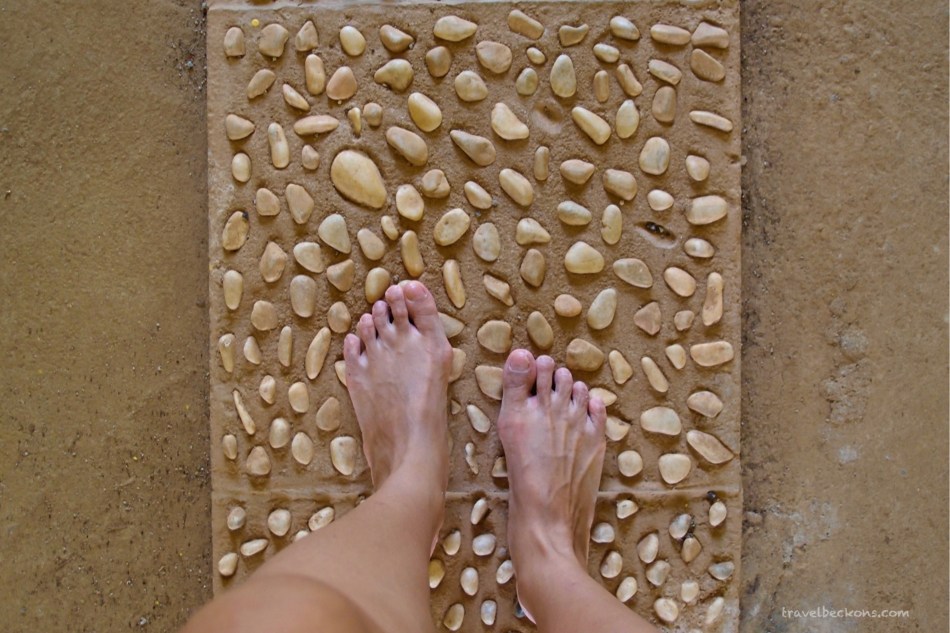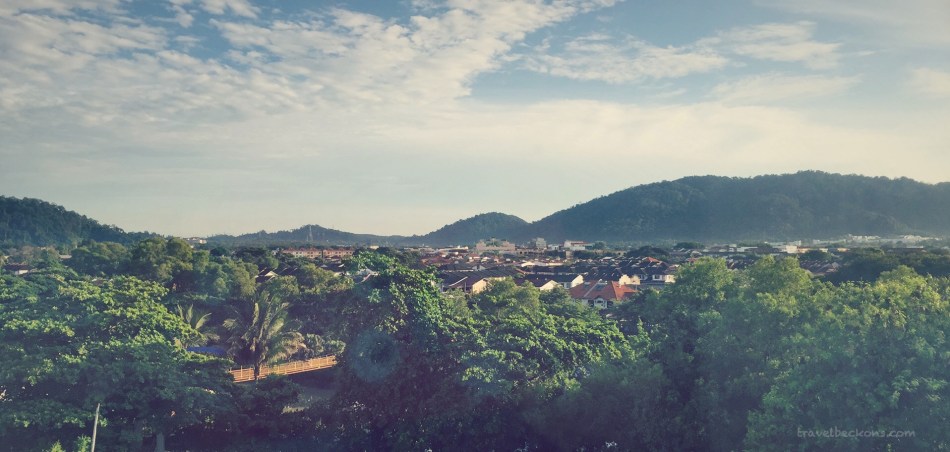Vipassana Experience Day 4: Seeking Truth and Walk Hard
Breathe in, breathe out. Deep breath. Where should I start?
It is surprisingly difficult to write about my Vipassana experience at Dhamma Malaya when the daily routine of what one does in this 10-day silent retreat can be casually summarised as keeping early hours, maintaining a strict diet and code of conduct, resting, and observing one’s respiration and mind. Yep, that’s meditation camp and that was mainly what I did for 10 days. There’s something to be said about silence though, which can be more deafening than noise.
I’m not sure if you think the same way as I do (I am quite ignorant on certain matters) but to me, the general idea of people seeking meditation retreat is to relieve tensions, get over a bad situation, or come out of addiction, etc. During the course, I found myself thinking, “I am generally content with life, so why am I here?”
(Note that I have never done any form of meditation except Shakyo in Japan.)
Through word-of-mouth, I got to know of this 10-day Vipassana Meditation Retreat at Dhamma Malaya and my curiosity got the better of me. With free time and a sense of spontaneity, I signed up for this camp with no real knowledge of what I was getting myself into. My initial thought was to experience a different type of travel, as I am always curious about what drives people to travel, and perhaps I may discover a good story or two and learn something in the process.
Meditation that draws a clear line from religions or sects sounded appealing. The fact that one needs not pay unless one felt the benefits of the retreat at the end of the session was liberating. Last but not least, the person who introduced it was a dear friend whom I trust (and still does), and that was how this journey of observing self-truth began.
What is Vipassana?
“Vipassana, which means to see things as they really are, is one of India’s most ancient techniques of meditation. It is a way of self-transformation through self-observation. It focuses on the deep interconnection between mind and body, which can be experienced directly by disciplined attention to the physical sensations that form the life of the body, and that continuously interconnect and condition the life of the mind.” – https://www.dhamma.org/en/about/vipassana
In simple terms based on what I have experienced, Vipassana is a meditation technique that requires one to observe respiration, mind and body sensations. And seriously? The sensations kind of freaked me out at first. I felt vibrations throughout my entire being, and certain parts of the body seem to be humming at times. It felt like the cells on the hands were dancing, and when we did metta – a loving-kindness meditation to direct well wishes to all beings in the world – there were tingling sensations at the back of the head, on the arms, from the chest to the back and the entire lower body. That felt surreal. Of course, there were also blocks of pain and numbness on other occasions. Try sitting for 1 hour without moving – it’s no joke! The idea was to feel the sensations and remain neutral with the knowledge that each sensation is transitory.
There are many different meditation techniques, and Vipassana differentiate itself by delving deeper to the source / crux of matters. While all meditation can help in a way or another, going to the roots of the matter can allow one to eventually resolve actual issues. The Chinese idiom ‘斩草除根’ translated literally as ‘cutting the grass and removing the roots’ is a befitting expression that advises on eliminating problems and leaving no chance for repercussions. There are ups and downs in life, and misery is unavoidable. However, if one understands and accepts this fact, one shall be happier and more at peace.
The Vipassana 10-day schedule is like this:
Wake up at 4am, meditate till 6.30am followed by breakfast.
8am till 11am meditate followed by lunch.
1pm till 5pm meditate followed by light tea + fruits.
6pm till 7pm meditate followed by 1 hour discourse.
9pm till 9.30pm meditate followed by lights-out at 10pm.
The strict codes of conduct include:
No talking. No killing (not even those ants, spiders, lizards, frogs, etc.!). No writing. No reading. No photography. No eating after 6pm. No dancing, yoga or vigorous exercises, etc.
First experience with Vipassana meditation

On the first night of our arrival, a resounding gong signalled the observance of silence as my new friends and I exchanged slightly alarmed and bemused expressions, having been interrupted mid-conversation. We didn’t even get to exchange our names! Still, this was what we have signed up for.
Clear instructions were given throughout our stay, and we soon found out the entire program was very systematic and well-organised. We were given an introduction on Vipassana meditation at the Main Hall where we would soon grow accustomed to, for that was where the daily group meditations were held. I was sitting on my meditation cushion alongside 100+ meditators in the dim hall with high ceiling that slopes towards a circle in the center of the roof when the chantings began and a deep voice came on. I wondered what I have got myself into!
Experience is the best way to learn
Breathe in, breathe out … … On one of the initial breathing sessions, I thought to myself behind closed lids, “Find out more about meditation and vipassana when you have your phone and Internet.” Already, I was outside of my comfort zone without my digital BFF (Google). We have to surrender our electronic devices, books, writing materials, etc. upon registration on the 1st day. On hindsight, the personal experience of doing something is the best way to learn about it, and that was what I did, not because of a wise mind or Confucius said so, but because I didn’t have my handphone then.
“By three methods we may learn wisdom: First, by reflection, which is noblest; Second, by imitation, which is easiest; and third by experience, which is the bitterest.” – Confucius
While technology is great, the opportunistic mind has taken advantage and became overly-reliant, lazy and irrational in the daily life. This is one of the life reminders that I’ve gained through my Vipassana experience. Don’t just read about it! Experience!
Everyone has different experiences, and there were some who gave up after a couple of days. The girl staying next door left on the third day. And indeed, there were a couple of days when I questioned my presence and intentions at the camp. The mind was protesting, fueled by the random migraines, wisdom toothache, and irrational fears of sleeping with uninvited roommates (fat lizards) that got too close for comfort in my 2m by 3m cell room! I worried about becoming crazy or thinking too much; finding three new strands of white hair on the 3rd day morning certainly didn’t help.
The fact that I wanted to write but couldn’t was another limitation that made me feel uncomfortable. By the way, doing meditation seems to increase one’s body temperature. I’m not sure if this only applies to Vipassana but I definitely was not the only one emitting heat. While I am generally thankful for warm temperature, being a heat generator in nature wonderland also means countless mosquito feedings. And no, no killing. That’s one of the rules. So, well … … Breathe in, breathe out.
*Anicca, Anicca, Anicca
*Anicca (in Pali term): impermanent, ephemeral, changing. One of the three basic characteristics
Like all situations in life, changes is the only constant. Before we knew it, time has passed so quickly and 10 days of fleeting thoughts, myriad emotions and ever-changing sensations were about to be shared with the breaking of silence. Tentative whispers soon grew to excited chatters, as everyone started finding their own voices, sharing experiences and getting to know the familiar strangers whose names we knew not, only tiny, intimate details such as one’s food habits that we observed in the dining hall.
Many have asked about my experience. Last night, the sis asked, “So what did you do every day? Did you really meditate the entire day?” I told her I meditated, ate and slept throughout my stay. She sounded unconvinced how I could survived just doing so little. Or perhaps so much.
Trying to tame one’s mind is a formidable feat, and of course I did not succeed in that. I am not sure if that’s necessary? During the meditation sessions, forgotten memories surfaced and mostly brought quiet joy. Deeper thinking also gave way to greater insights and shall serve as good life reminders. My consolation lies in the strong determination for sitting still for an hour (or sometimes more) and being aware when the mind went on one of its jaunts. All in all, I supposed I adapted well or perhaps better than most, once I could get over the fact that lizards are here to stay, whether I sleep or not. Breathe in, breathe out. My solution was to sleep with a scarf covering my head and ears.
Would I recommend Vipassana meditation?

This is the 4th day after my 10-day silent retreat, and the fact that I am still doing the meditation twice a day speaks volume. One will most likely be put out of your comfort zone (kinda like embarking on one of those foot reflexology stone paths), but I do sincerely believe that there are benefits to be gained at the end if you can make it through. Personally, I felt more aware physically, emotionally and mentally.
Would I do it again? To be honest, my answer on day 10 was ‘maybe (reluctantly), but not anytime soon’. Now, my answer is a definite yes, but of course not anytime soon. I am still observing the effects and reviewing how this can further improve my life. There are still thoughts that I need to sort out. Breathe in, breathe out.
Our teacher, Mr. S.N. Goenka kept emphasising since day 1; intellectual knowledge is insufficient because one may know something but still do things in the opposite manner. Experiential knowledge is of utmost importance, and this is something that resonated well with me. Reading or watching videos on Vipassana may give you certain knowledge, but it is only with true experience (like all other matters in life) would one fully understand what it truly entails.
So, take my experience and words only as reference. You will only know the truth when you experience it. To find out more about Vipassana or to register your interest, click here: https://www.dhamma.org/en/about/vipassana
If you have enjoyed the above article, please stay tuned for more as I will be sharing a series of my daily thoughts on the 10-day Vipassana meditation at Dhamma Malaya along with some useful tips to know before going. If you have any questions, please feel free to leave a comment. Peace, harmony and happiness to all!
Related article(s):
- Vipassana Experience Day 1: Addiction and Breathing
- Vipassana Experience Day 2: Living in the Moment
- Vipassana Experience Day 3: Pain and Beauty
- Vipassana Experience Day 4: Seeking Truth and Walk Hard
- Vipassana Experience Day 5: Vibrations and Meeting the Teacher
- Vipassana Experience Day 6: Strong Determination
- Vipassana Experience Day 7: How many colours are there in the clouds?
- Vipassana Experience Day 8: Law of Nature
- Vipassana Experience Day 9: True Love
- Vipassana Experience Day 10: Gifts, Mindfulness & Metta


Wow beautiful natural photography